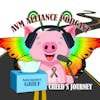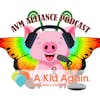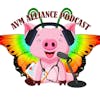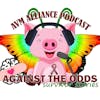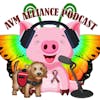Episode 15: Against the Odds
Sometimes parents of children who have suffered a stroke feel like they don't fit in and we provide an analogy that hopefully will change that mindset. Our guests today are AVM Brain bleed survivors Kyler Lewis and Ashley Lindsey who talk about what it is like to deal with brain vessel disease. We end the podcast going over our last chapter of our focus book, Suffer strong where Jay talks about "The Unknown" and we learn about the importance of hope when suffering and finding bravery to illuminate the darkness and uncover the treasures hidden there.
Today is the end of season one, our 15th episode. We talk about why some parents of children who have suffered a stroke feel like they don't fit in and provide an analogy that hopefully will change that mindset. Our guests today are AVM Brain bleed survivors Kyler Lewis and Ashley Lindsey who talk about what it is like to deal with brain vessel disease. We end the podcast going over our last chapter of our focus book, Suffer strong where Jay talks about "The Unknown" and we learn about the importance of hope when suffering and finding bravery to illuminate the darkness and uncover the treasures hidden there.
Our FB Page: https://www.facebook.com/AVMAlliance
Our FB Group: https://www.facebook.com/groups/325321586185434
Instagram: https://www.instagram.com/avmalliance/
Webpage: : https://www.avmalliance.org
Twitter: https://twitter.com/avmawareness
YouTube: https://www.youtube.com/@avmawareness
Personal Blog: https://www.caringbridge.org/visit/kylerlewis
TIKTOK: https://www.tiktok.com/@avmsurvivor
Raylene Lewis:
Hi there,and thank you for joining us on AVM Alliance,a pediatric stroke podcast for families and friends whose lives have been affected by traumatic brain injury,brain vessel disease,or stroke.The purpose of this podcast is to focus on the kid side of brain injury with honest Talk News information and discussion for our community.Being a parent of a medically complex child is an extremely difficult path to suddenly find yourself on.I'm Raylene Lewis and my son Kyler suffered a hemorrhagic stroke at age15.Thank you for joining us.This episode is very special to me personally because it marks a milestone,a promise that I made to myself.When I started this podcast,I told myself I would keep going no matter what,until I had produced15episodes and walked listeners through all the important healing information,and our focus books suffer strong.Today is the end of season one,my15th episode,and I absolutely saved the best guests for last.But before I get started with today's interview,I wanted to bring up a reoccurring theme.I have noticed in parents who are dealing with brain vessel disease and stroke.I have heard a lot of voices.Say,I feel like I don't fit in with other brain,a v m,brain vessel disease,stroke parents because,and that's usually followed with things like,my kid doesn't have a risk of bleed anymore.My kid is at risk for another stroke.My kid has more or less deficits than everyone I see.Or because now I'm the parent of an angel.But I want you to think of it this way,and please totally forgive the analogy because I wrote this way before all of the news stuff with the Titan Submarine.We were all living life on the Titanic,cruising right along,having no idea about the pediatric stroke aneurysm or AVM iceberg.Our ship was about to hit,and when the iceberg hit,we had to suddenly abandon ship on liferafts.Some of us made it to the raft with our child,but some did not make it to the raft and we were left floating without them.Some of our kids made it to the raft,but suffered permanent brain damage along the way.The point is this happened to all of us and we are all in the same situation together.So for that reason alone,you absolutely do belong.And on that note,we now have a support group that meets monthly over Zoom.And we would truly love to have you join us.The AVM Alliance Podcast brings all types of guests,and for my season finale,today's guests are extra special to me.They are two AVM brain bleed survivors.My son Kyler and his friend Ashley,both Warriors,who continue to beat the odds.I am so excited today because with me is Ashley Lindsay and Kyler Lewis,who are two guests that are very near and dear to my heart.I want to talk a little bit about your story to begin with.
Ashley Lindsey:
The super short version of my story is I was21.When I had my AVM rupture and it resulted in removal about half of my cerebellum with that was removal of my AVM itself.So now I'm just living with the deficits that the bleed left me.
Raylene Lewis:
That's gotta be really hard.I mean,one day you're.Talking just fine.There's no issues at all.And the next day you're finding that you're having to have yourself in physical therapy and kind of relearn everything.And I think that's really how it works with abms.It's like it just hits you overnight and changes your life forever.What's one thing that you would want?Parents to know or other survivors to know that you have learned from your experience?
Ashley Lindsey:
I would say just that even though everything moves relatively slowly,I'm three years out and still seeing improvements.Every day.
Raylene Lewis:
How many hours of therapy have you done so far?
Ashley Lindsey:
A Ton!I've done every day from like nine to five,physical,occupational,and speech therapy.And then start in January,I,I cut back on therapy hours so that I could enroll in school and.Spend time being a student.
Raylene Lewis:
Congratulations.Back at a and m,right,which is where you were before the rupture,right?Yes.
Ashley Lindsey:
So I got to finish my junior year before my rupture.And so I just had the last year,of course.Where
Raylene Lewis:
left?Congratulations.Now,Kyle,your story is a little bit different in that you had.Bleed at age15,but it was not massive.It was a smaller bleed.Can you tell me a little bit about your story?
Kyler Lewis:
Sure.So I had a stroke at15,but my stroke,it bled into the ventricle,so I got super lucky,so it didn't spread through all out my brain.
Raylene Lewis:
And Ashley was lucky you could say,because when she had her event,was able to have her a v m removed as part of her surgery,which,which saved her life.But you had a completely different outcome.Can you tell me a little bit about
Kyler Lewis:
that?My outcome was whenever they found out about my avm,we had to figure out.What solution they were going to do to treat it.So I did gamma knife radiation chemo,lots of physical and.Occupational and speech therapy,but not as much as Ashley.
Raylene Lewis:
The biggest difference,I think,with you is that when we discovered your a v m,it was a large grade.Some doctors said it was a four.Others said,no,it's,it's a five.I had always thought that it was about six and a half centimeters,which is.Know it was huge.It was about the size of a chicken's egg,but when I saw the last reports,it turned out it was,it was even bigger than that.It was over seven centimeters.And so with an ABM that size,you can't remove it.Surgery's not an option.So gamma knife radiation was really the only choice that we had.And I think maybe different for some is that a lot of the issues that you dealt with were one.Because the AVM was so large to begin with,it was putting a lot of pressure on your brain and causing problems that it did damage from something that's called the steel effect.And the steal effect is when the AVM takes.Blood from good brain tissue and kind of steals it.And so that causes brain tissue damage around the avm.But also just the fact that it was putting pressure that you had this really big mass that was putting pressure on surrounding tissue and it was cutting off,you know,oxygen and blood to to tissue as well.So for you,I think your deficit.Kind of started a little bit more slowly and we didn't know what was causing the problem until you had the,the bleed because your AVM was not.Removable.We had the gamma knife
Kyler Lewis:
radiation.My reaction to gamma knife radiation was not very common and it kind of like overdid it,and so I had to go on steroids for quite a long time.I hated the steroids.I told my mom that if I didn't,my face did not go back to normal,that I was getting plastic surgery because I
Raylene Lewis:
hated the way I looked.Yeah,the steroids made you pretty puffy.Something that's called.Face not fun,but you guys both have overcome a lot of challenges,I think,that have been thrown your way.What's a different way that you think about life now?I would
Ashley Lindsey:
say that if anything,This has pushed me to be more of an independent person because obviously I have to rely on the others for quite a bit.But if.I can do something for myself,then that is something I want to pursue.
Raylene Lewis:
Well,and speaking of that,huge kudos to you because as part of your therapy,you have been doing driving,right?Yes.Correct.Oh my gosh.Okay.So tell me a little bit about that,because a lot of people,I think would think,oh my gosh,if you had a rupture in your cerebellum and you can't use,you know,your hands like normal and your feet like normal,how on earth can you drive?How does it work?So.
Ashley Lindsey:
Since I have closeness it my feet,I have to use hand controls instead of pedals.And there's one lever that is for gas or brake,and then I attaches spinner,not,not to the steering wheel.So I can do full rotations with one hand.The major challenge has been my richest processing speed because that's obviously,A hazard when driving as I'm just getting more used to things,if they're becoming more of a habit rather than a processing
Raylene Lewis:
and then makes sense.Now,Kyler,you had to go through some driving therapy as well.So my
Kyler Lewis:
driving therapy was kind of like a video game,so they put me on this machine.It was made by Ford.And it was like a driving simulator.So they would have three screens all around me and the seats.They even had a radio air conditioning.I mean,it was a real wheel.It was like a video game.And so,I would drive on it and I crashed a couple times.
Raylene Lewis:
So my,my favorite like telling on you a little bit was that when we were doing this therapy you got really cocky on it that like you didn't need it and that,you know Right.You knew how to drive.It was great.And the therapist that was handling all the simulations was like,oh,okay.Yeah.You know,that's great.Like she didn't argue with him when he was being all cocky,and then she put in a simulation where the people and the other cars don't follow the rules that they're supposed.She didn't tell me
Kyler Lewis:
that.She did not tell me that.
Raylene Lewis:
No,she didn't.She just hit play and then,and then you were like,wait a minute.He came in my lane and he didn't signal,and bam,you crashed because she was trying to tell you that you have to be prepared for all situations.You can't just always expect the drivers around you to do what they're supposed to.Okay.
Ashley Lindsey:
There's the.I didn't use a driving semi later,but through all my therapy was around some,even the therapist that were able to use it where like,This thing is incredibly difficult.
Raylene Lewis:
I think people who are not used to going and attending therapy would be really surprised how much hard work it is,even if you have had no brain issue or injury at all.I remember.When I was sitting with Kyler and they were working on cognition,they had pictures of objects,and if the objects were rotated a certain way,you had to say,switch image is a rotated version of the same image.You know,things like that.And there were quite a few times when I missed them.I was,you know,in my head watching.I was like,oh,nope,I got it reversed.I got that one wrong.What's one thing,what's,what's something that you want people to know in general?I'll go ahead
Ashley Lindsey:
and say,just because I talk part ially Does not mean my intellect is any less,which is not a tender thing to think about whenever you're having a conversation with someone.
Raylene Lewis:
Absolutely,and I think that's something that a lot of people who have aphasia issues struggle with.They are.Just fine mentally,there's no issues.But yet other people take for granted that because they don't speak at the same speed or the same rate,that they're not the,the same level of intellect.How do you deal with that?
Ashley Lindsey:
Lots of people.Some they make there assumptions,but it's really just a matter of getting to know people.And I.Realize,just because you sound different doesn't necessarily mean that all the whole process is different.
Raylene Lewis:
Kyler,you've struggled with this too,but in a bit of a different way.People could not see your A V M,they could not see your swelling,and for a large portion of the time,you were not in a wheelchair.But when you didn't respond at the same.Level,like as fast,right?As people expected,or you've had a lot of trouble focusing like sounds,noises,things like that have been difficult for you.What's one thing that you have used to say that you just had a brain injury?
Kyler Lewis:
I kind of just understand that they don't understand.Just because you can't see deficits doesn't mean they don't have any.I mean,I kind of just explain.I might not understand,or it might take me a little while to process this.Sam helps me I guess you could call him an emotional support animal as well as a service dog because he is definitely here for me emotionally.He will let me know and he'll let my mom know if something's wrong and he gets really
Raylene Lewis:
protective and well,and do you feel like Sam Sam's makes you more approachable?I think so.
Kyler Lewis:
I think,is he gonna a chick magnet?Yes he is.Ask Ashley.
Raylene Lewis:
Ashley,what do you think?
Ashley Lindsey:
I like Sam More than Kyler.Oh my gosh.Sam is so cute.
Raylene Lewis:
Yeah,he's now Ashley,you have grown.With your therapy and got a new love for plants.Is that right?Yes.
Ashley Lindsey:
I love to do all kinds of gardening.My mom and I would visit gardens and nurseries a lot.When I first got held at the hospital,
Raylene Lewis:
what is one thing that could help other a v M survivors really figure out how to take a step forward in their recovery?I would
Ashley Lindsey:
say figuring out what you can do with your type visits.Once you figure out what you.Can,can do,you can make a better decision about what's realistic for the future.
Raylene Lewis:
I think exploring and really focusing on what you can do is so important because a lot of people focus on what they can't do.So I think that's an excellent point.And one thing that I'd like to just say in general is I personally do not have not had a brain injury.Right?But there are lots of things that I can't do,and I think that's the way it is with everybody.So maybe they're,they're new things for some people,but figuring out what you're good at and what you love is something that applies to all of us as people.And you've
Ashley Lindsey:
mentioned all of my planting.I quickly learned that I could care for from a wheelchair.That was definitely a focus on something I could do and
Raylene Lewis:
do well.
Kyler Lewis:
AVM is one of those things where I could go to anyone right now and they'd probably not know what it is.I use my AVM to spread awareness.
Raylene Lewis:
Yep.Spreading awareness is super important.Well,I just wanna thank you and I really appreciate your time and I wish you both the very,very best and your recovery and I can't wait to see what all you guys do.Thank
Ashley Lindsey:
you.Congratulations on finishing up your season.
Raylene Lewis:
Thank you.In the final chapter of our focus book,suffer Strong,Jay talks about things outside of our control,the unknown.Today could be the best day,the worst day,or the last day of our lives,but it does not mean we need to live in fear.Instead,it is important to focus on what we know to be true and who the important people are around us.We also need to help each other to remember to focus on what matters most.Sometimes we have to remind ourselves about things we know for sure over and over before our hearts are ready to believe.Jay points out that even though we are powerless in some ways to the unknown,we are definitely not helpless.He also points out how some people will try to bargain with God,but a good deal requires two signatures,and any bargaining we try will only have our own,so no deals can ever be made.Jay quotes Bloom who said,never be afraid to trust an unknown future to a known God personally.I had trouble when I read this because it was one of the last things Carla's friend Eden wrote to him before having an another brain bleed and gaining her wings.But I have come to learn that as Jay says,hope is a future promise lived out in the present that is not dependent on our ability to feel it,to keep it going.We have all heard the phrase that life defines us,but suffering strong can redefine us.And hope is a very healing thing.Each one of us only gets one life to live,and it's up to us to live it well to the very end.As you have heard me say before,one of my favorite sayings is when it rains,look for rainbows.And when it's dark,look for stars.Find the bravery to illuminate the darkness and uncover every last bit of treasure hidden there,even in suffering.Search for and find the hope.Today's quote is by CS Lewis.What draws people to be friends is that they see the same truth.They share it.I always like to end our time together with a motivational song recommendation.I don't play the song because of copyright laws,but there have been many times on this journey where a song has really spoken out to me and helped me with my day.Today I'm recommending you check out Believer by Imagine Dragons from their2017album Evolve.It is one of Kyle's favorite songs,and it's a song reflecting on specific things in life that are painful,facing your inner soul and finding a place of peace and self-confidence.A lot of the lyrics truly hit home.And as always,if you have questions,have a topic you would like to hear about,or a great song or motivational quote.Don't be shy.Share it in the comments and let us know.And if you liked what you heard today,please go online and rate this podcast.Remember,you're never walking this journey alone.Take care y'all.
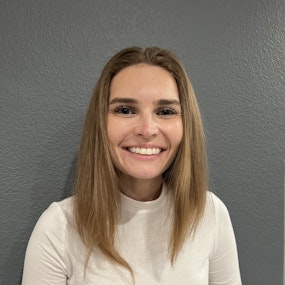
Ashley Lindsey
24 year old student at Texas A&M in biological and agricultural engineering. My AVM ruptured in May 2020 after I finished my junior year.
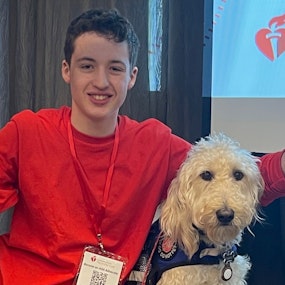
Kyler Lewis
Avm Brain Bleed Survivor
On April 10, 2020 Kyler was riding in the car with his mom when he suddenly turned to her very confused. He told her he didn't know where he was or how he got in the car. His mom rushed him to Texas Children's Hospital where he was diagnosed with an Acute spontaneous intracranial hemorrhage. He was bleeding in his brain from an Arteriovenous Malformation (AVM) a rare congenital condition that effects less than 1% of the population. He required emergency surgery to stop the hydrocephalus (Brain Swelling) the rupture in his brain had caused. An MRI later revealed that Kyler's AVM is a Spetzler-Martin grade 5 in the Parietal/occipital lobe. It is a Ticking Time Bomb that can rupture again at anytime. Kyler has spent the last 3 years undergoing gamma knife brain radiation and chemotherapy to treat this disease. He hopes that one day his AVM will be small enough to be removed via a craniotomy. Until then, with his dog Sammy, he advocates for pediatric stroke and brain AVM awareness.





























